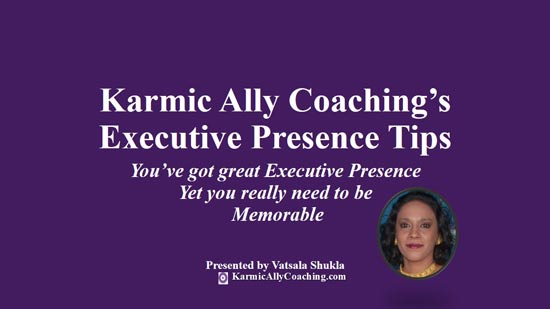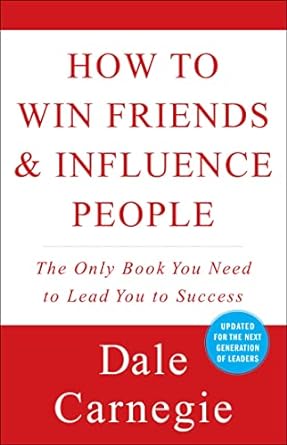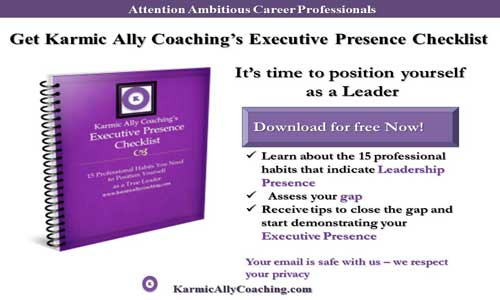This post has already been read 745 times!

So you’ve got great Executive Presence and people experience it when you’re in the room but what about after you’ve left? Are you memorable?
Now this is coming out of a communication that I had with a subscriber of mine who had tried the Karmic Ally Coaching Executive Presence Checklist and she told me that people told her she had Executive Presence, she felt she had it and YET she was also told she wasn’t memorable!
Prefer to read? Here’s the transcript
Now I don’t think that’s a very good thing because when you are trying to build up your career and go places, then you shouldn’t be like a one hit wonder on the Top of the Pops List but more like an evergreen song.
So are you?
Hi, I’m Vatsala Shukla, Chief Encouragement Officer at Karmic Ally Coaching and today I’m going to be looking at how to become memorable when you’ve got great Executive Presence.
But first things first. Do you believe you’re memorable? Hold that thought and let us go through this and then of course, we’ll come back to this question.
But first things first let’s get on the same page.
And that is, what’s being memorable?
Now there’re lots of definitions in the dictionary and the one that I’ve chosen comes from the Cambridge Dictionary, which defines Memorable as being “likely to be remembered or worth remembering”.
So it’s not just that, there are a lot of other things that are involved in being memorable.
And that is,
Are you memorable for the right or the wrong reasons?
Now let me give you an example. On the left hand side, there’s this lovely Chinese restaurant and in fact, when this lady had written to me, I told her it could be a matter of communication and that of course its better not to be remembered than to be memorable for all the wrong reasons.
It immediately took me back to a restaurant that I used to frequent as a student days in my London days in the late 1980s called Wong Kei. And it was famous for all the wrong reasons.
The biggest one being the waiters were very, very, very rude. You know they’d shout at you to Sit down, shout at you if you asked for a fork and knife, shout at you and run after you if you did not give a suitable tip. The food was divine.
And I suspect all of us went there more for the experience of rude waiters rather than anything else. Of course the management changed I believe in the early 2000’s and after that the waiters became friendlier.
But even today, 30 odd years later, I remember Wong Kei as much for the food, as much for the rude waiters and the way they slammed stuff on the table.
On the right hand side we’ve got this really nice, three course meal dinner table and that one is related to another story that I remember about Dale Carnegie, the one who wrote about how to win friends and influence people.
He actually tells a story about how he got a great sales opportunity at a dinner table party where he sat next to a man who spoke for 4 hours non-stop allowing Carnegie to only speak for about two minutes.
But, at the end of all of it, this man declared that “Dale Carnegie is the best conversationalist I’ve ever met”. I mean, when you’ve only spoken for 2 minutes?
Well here’s the deal. Mr Carnegie used active listening and showed he was interested in this gentleman. And the rewards were that he was remembered and he was given an awesome sales opportunity.
Now given a choice, which one would you want? Would you want to be memorable for the right or the wrong reasons?
Adopt a positive body language
So here’s a quick tip also inspired by the Carnegie story and that is to adopt a positive body language because that is a silent but powerful communicator.
In other words, your posture, facial expressions, your gestures, they all convey volumes about your Executive Presence.
And I’ve actually got a blog post that goes deeper into the posture for Executive Presence, but in the coming slide there are some quick wins.
Firstly, there are 3 keys to positive body language.
The first is of course good posture where you stand tall, shoulders back, straight back.
You know, when you stand tall, people tend to remember you more than a slouchy person. Unless you’re the hunchback of Notre Dame, which I know you are not.
The other one is holding an open position, you know, a relaxed look with arms and legs uncrossed, fists unclenched, open palms, you’re inviting people to converse with you.
And thirdly is just smile and maintain good eye contact because that also indicates receptivity and it creates trust.
So based again on our story and a few other things, here are some more quick wins that you can use to become memorable.
Firstly, you need to make an extra effort to remember people’s names. Mr Carnegie has gone as far as to say the sweetest sound to anybody’s ears is the sound of his own name.
Make everyone feel important by paying full attention to him or her. Make them feel like they’re the only person in the room and that they’re the only people who matter even if you don’t feel so but you know building trust with the other person.
Show curiosity and interest in others and develop the skill of active listening. You know, there’s too much hearing going on in the world right now and not enough listening. So if you can develop this skill, you’re much ahead of others.
Of course display a sense of humor and become a good conversationalist by keeping abreast of current events. At least listen to the news if not read the daily papers and know what’s going on in your industry.
Most importantly, please don’t drone away and bore people to sleep. You know, speak concisely short to the point. Nobody has time to hear a whole story before you get to the point.
And always ask people for their opinions. I mean, people love the sound of their own voice. They like to feel heard.
Do not interrupt when someone’s talking and most importantly give compliments.
Be genuine when giving compliments. Just make sure you’re not coming across as being insincere.
And if you also need to develop some Executive Presence AND be memorable, here are 5 ways you can do it.
Firstly, create a great first impression. You know your first impression is critical and once its done its done.
You won’t be able to take it back even if turns out you’re the best person to help the other person across you, for a very important job interview as well as for a very important promotion if there is somebody who doesn’t know you who’s doing the interviewing. I’ve also got a blog post on that. I’ll share the link with you.
The second one is own your uniqueness. I’d love to say take ownership of your quirks but maybe your uniqueness is the better way to put it across because when you blend in, nobody remembers you but if you actually differentiate yourself for all the right reasons, now remember you’re not going to want to be remembered like the rude waiters at Wong Kei restaurant.
Instead, you’ll want people to remember you for something better. So own up to your uniqueness. Use it.
Practice the Law of Giving. The world nowadays is so full of me, me, me. People are always trying to take and not give. Be generous. Give things. If you can add value to someone’s life, do it. If you know somebody who’s a good fit, use your network skill to connect people.
All of that comes under the Law of Giving and again I’ve got a blog post and I’ll give you a link for that.
And fourthly work on developing your expertise. In other words, don’t try to be a jack of all trades. People remember things that are superlative.
So you need to first find out your superpowers then integrate it into everything you do. Be consistent about it. Let people remember you for all the right reasons.
If you’re great at storytelling, use storytelling tell anecdotes in your conversations with people. They will remember you for it.
Or if you’ve got a special style of doing things, stick to it. If you’re great, good at giving presentations, stick to the presentation giving in the office rather than trying to be at the back-end of things.
And most importantly, always keep a positive optimistic attitude. You know, there’s enough negativity going around you. You don’t want to be memorable for all the wrong reasons.
You don’t want someone saying if there’s an opportunity coming up for you for a leadership role or something that’s a task or a project that can take your career places, you don’t want to be shut off from that just because someone says ‘oh you know, this person has a negative attitude or this person is very difficult to work with.”
Instead, optimistic positive people keep brightening up the room wherever they go and that too is a part of Executive Presence. It’s part of your WOW factor. So keep a positive attitude. Work on it.
And if you’re feeling curious then this is the exact Executive Presence Checklist that my subscriber used in order to determine if she had Executive Presence and as it turned out she did but she wasn’t memorable.
So now that I’ve told you how to be memorable why not also check out whether you have all these 15 professional habits that indicate Leadership Presence and your Executive Presence of course.
Besides its free. So you have nothing to lose. Other than pay with your email address and download it and there’s a lot more that goes along with this.
So coming back full circle, try the suggestions that I gave you for improving your memorability and then let me know, are you being memorable for all the right reasons?
I look forward to reading your comments. And that’s all for now. See you soon in my next set of Executive Presence Tips. This is Vatsala Shukla signing off. Bye.





 I adhere to the Certified Coaches Alliance Code of Ethics and Standards. A copy is available on request.
I adhere to the Certified Coaches Alliance Code of Ethics and Standards. A copy is available on request.
 Let's Talk through the Connect Form:
Let's Talk through the Connect Form: